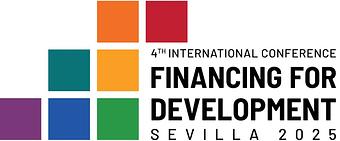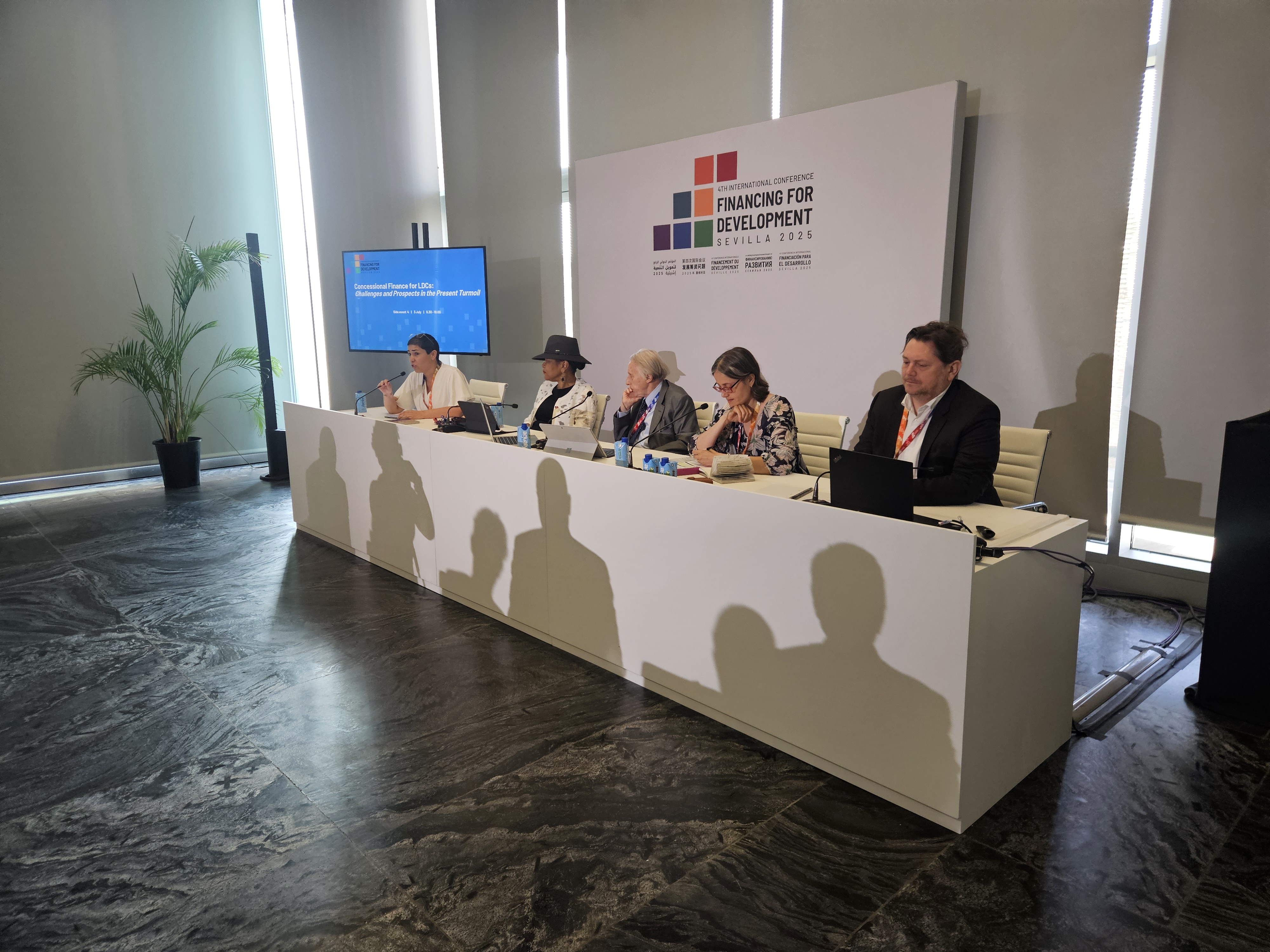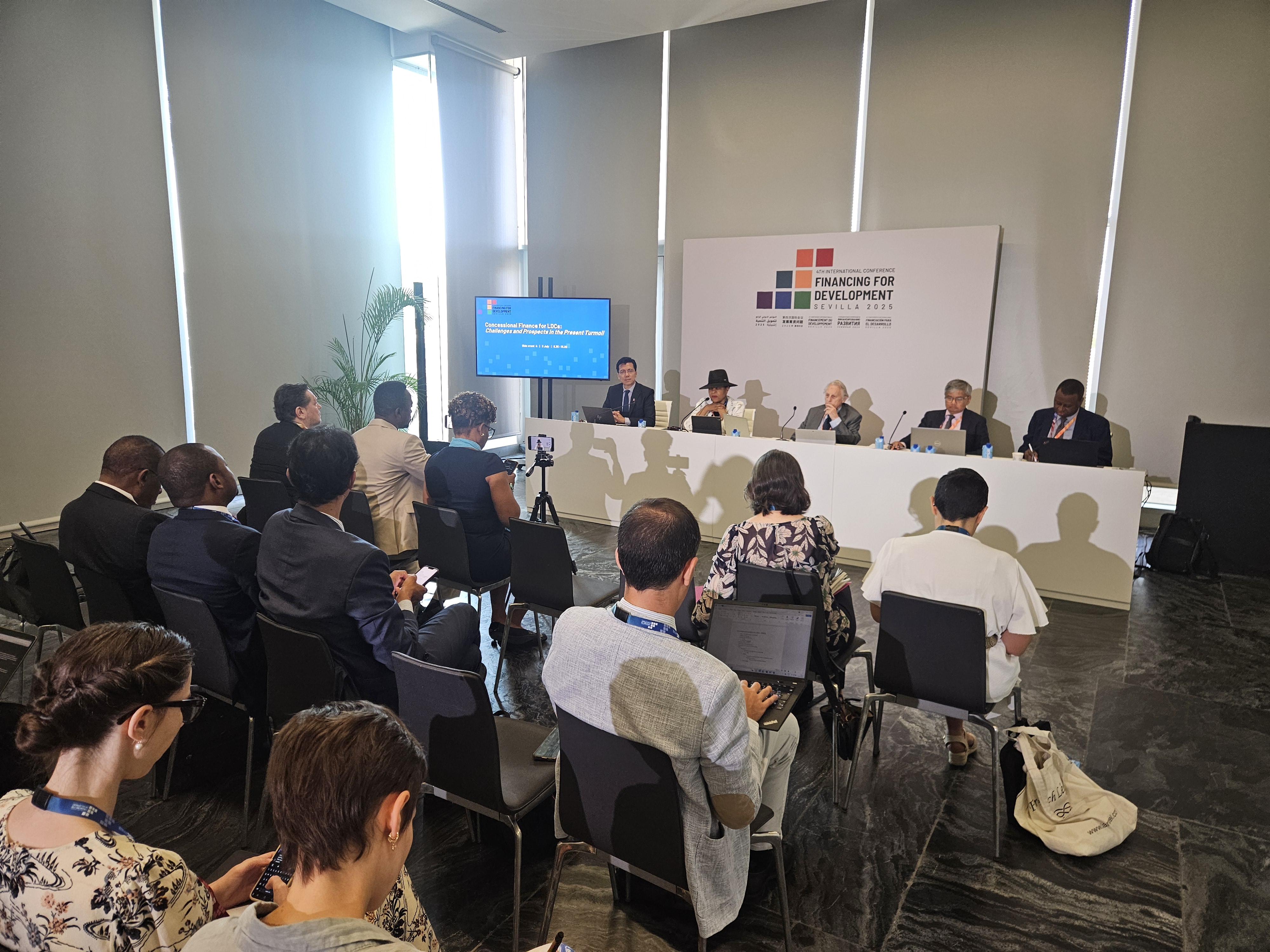








Date: Thursday 3 July 2025
Time: 8:30 a.m. – 10:00 a.m.
Venue: FIBES Sevilla Exhibition and Conference Centre – Side Event Room 4
Format: In-person
Organizers: FERDI & Benin in collaboration with the OECD Development Centre and UNU-WIDER, as part of the LDC-V Monitor


Given the many current challenges facing LDCs, the panel will look at ways of maintaining substantial concessional funding for the development of LDCs in the short and medium term, notably through a reform of the rules governing the allocation of funds by multilateral financial institutions, but also by bilateral donors paying greater attention to the characteristics of LDCs when choosing their funding priorities.
It will also simultaneously examine the capacity of the LDCs to compensate for any reduction in external financing by an increased fiscal effort and, in the medium term, by a structural transformation that reduces their vulnerability.
This interactive session will provide an opportunity to explore the points raised, compare ideas and explore concrete solutions.
The conclusion should provide a summary of the main points discussed and emerging recommendations.
Many LDCs are particularly constrained in their ability to mobilise sufficient resources at home or on the international markets, and are still largely dependent on concessional financing to ensure their development. The Doha Programme of Action for LDCs, adopted in 2022 under the aegis of the United Nations, recognises that "LDCs are heavily dependent on public resources to finance their sustainable development needs", as well as "the heavy dependence of the least developed countries on external resources, including ODA".
However, while the challenges facing the LDCs are, by definition, structurally significant, recent changes in the international architecture of development finance do not appear to be favourable to these countries. On the contrary, several risk factors now threaten the sustainability of financial flows to these countries.
One of these risks is the shift in international donors' priorities towards financing - albeit justified - global public goods (GPGs), in particular climate change mitigation. As this GPG requires the mobilization of considerable amounts of money, its financing is likely to divert funds initially intended for the development of the poorest and most vulnerable countries, countries where the impact in financing mitigation may be limited compared to the primary objective of reducing emissions. The growing financial commitments from international donors to finance the fight against climate change and the promotion of other GPGs in emerging and developing countries (climate change mitigation and adaptation, biodiversity, loss and damage funds, plastics, etc.) is likely to accentuate these crowding-out effects.
In addition, since 2022, international financial resources have been reallocated to Ukraine to meet urgent reconstruction and humanitarian support needs, which seems to have reduced the capacity of donors to concessional financing to LDCs.
These risks are all the more significant in that they are accompanied by a new but potentially lasting trend of reduction in official development assistance from the main OECD DAC donors, who are facing their own economic challenges, whether in terms of financing GPGs, ageing or public debt levels. Concessional financing for LDCs could then become scarcer.
These trends have been amplified by the new geopolitical and geo-economic situation brought about by the first decisions of the new US administration: (i) The resulting disruptions to international trade are likely to hit the LDCs hard; (ii) the growing uncertainty and consequent instability of international financial markets is having a particular impact on the most vulnerable creditors; (iii) more clearly the sudden drop in US funding for developing countries, particularly LDCs, may have a contagion effect on other main donors.
This session will be a follow-up of the event “LDCs in the international development financing architecture” organized during the UN Summit of the Future Action Days by Ferdi, OHRLLS and Permanent missions of Nepal and France to the UN, in collaboration with OIF, with keynotes by Rabab Fatima and Shari Spiegel. During this event, it was agreed that financing for the development of LDCs should be a key issue for the FfD4 Conference, and the panelists of this previous event or their representatives will be invited to the side event proposed for Seville, while priority is now given to high-level speakers from LDCs.
Moderation
↪ Patrick GUILLAUMONT , President General, FERDI (moderator)
Panel discussion
↪ Ketleen FLORESTAL, Minister of Planning and External Cooperation, Republic of Haiti
↪ Lok Bahadur THAPA, Permanent Representative of Nepal to the United Nations, Chair of the Global Coordination Bureau of LDC and Vice-Chair of ECOSOC
↪ Abdoul Salam BELLO, Chief Policy Development and Coordination, Monitoring and Reporting Services, OHRLLS, and Former Executive Director of the World Bank Group for the Africa Group II
↪ Elea WERMELINGER, Deputy Head of Department for International Development, Ministry for Europe and Foreign affairs, France
↪ Shanti BOBIN, Deputy Directorin charge of Multilateral Financial Affairs and Development, French Treasury, France, Ministry of the Economy, Finance and Industrial and Digital Sovereignty, France
↪ Kunal SEN, Director of UNU-WIDER
↪ Olivier CATTANEO, Head of the Policy Analysis and Strategy Unit in the OECD Development Co-operation Directorate